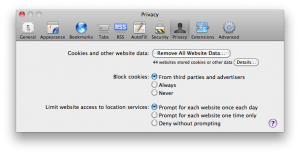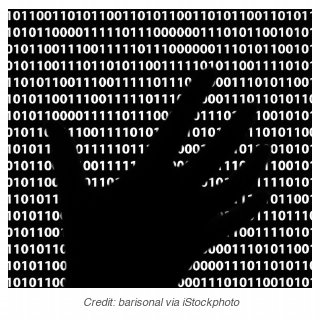 Several privacy lawsuits against Google, Inc. have been consolidated in the U.S. District Court for the District of Delaware following a ruling by the Judicial Panel on Multidistrict Litigation (JPML). In In Re: Google Inc. Cookie Placement Consumer Privacy Litigation, the JPML found that “eight actions involve common questions of fact, and that centralization in the District of Delaware will serve the convenience of the parties and witnesses and promote the just and efficient conduct of this litigation.” In a footnote, the JPML also acknowledged the presence of twelve other related actions that may also be consolidated for adjudication. In total, there are at the time of writing 16 cases consolidated in this action.
Several privacy lawsuits against Google, Inc. have been consolidated in the U.S. District Court for the District of Delaware following a ruling by the Judicial Panel on Multidistrict Litigation (JPML). In In Re: Google Inc. Cookie Placement Consumer Privacy Litigation, the JPML found that “eight actions involve common questions of fact, and that centralization in the District of Delaware will serve the convenience of the parties and witnesses and promote the just and efficient conduct of this litigation.” In a footnote, the JPML also acknowledged the presence of twelve other related actions that may also be consolidated for adjudication. In total, there are at the time of writing 16 cases consolidated in this action.
Articles Posted in Cyber Security
![[Onward_Replacement_Image] 6.5.12_Marino_CLE_lawsuit_accuses](https://lawblog.justia.com/wp-content/uploads/2015/05/Onward_Replacement_Image-6.5.12_Marino_CLE_lawsuit_accuses1-300x300.jpg) A continuing legal education company headed by Joseph Marino (inset, left), the legendary force behind a 65-year-old family-owned New York and New Jersey bar exam course, sued a former employee for alleged theft of “invaluable data” from his more recent CLE company’s business.
A continuing legal education company headed by Joseph Marino (inset, left), the legendary force behind a 65-year-old family-owned New York and New Jersey bar exam course, sued a former employee for alleged theft of “invaluable data” from his more recent CLE company’s business.
The Marino Institute of Continuing Legal Education, Inc. (‘Marino’ CLE’) accuses ex-employee Omar Issa (inset, right) of lifting Marino CLE trade secrets, breaching a fiduciary duty to his employer “by taking technology and…leaking confidential information and proprietary information” to his competing business while still working for Marino CLE
 If you think that texting is so ’90s, guess again.
If you think that texting is so ’90s, guess again.
A new criminal case against former BP employee Kurt Mix is an important reminder that, while social networks like Facebook and Twitter may be all the rage, deleting work-related text messages from your mobile phone might get you in trouble with the law.
Especially if prosecutors can prove that you obstructed justice by hiding something from a criminal investigation. In Mix’s case, the investigation involved BP’s deadly Deepwater Horizon oil spill in the Gulf of Mexico.
 Yahoo! Mail user Albert Rudgayzer sued the Silicon Valley web portal yesterday, charging that Yahoo’s revelation of users first and last names when they send email violates the portal’s own Terms of Service (‘TOS’), constituting a breach of contract. He seeks relief under federal and California state law.
Yahoo! Mail user Albert Rudgayzer sued the Silicon Valley web portal yesterday, charging that Yahoo’s revelation of users first and last names when they send email violates the portal’s own Terms of Service (‘TOS’), constituting a breach of contract. He seeks relief under federal and California state law.
Rudgayzer, a New York lawyer, alleges that he began using Yahoo email around October 2011. He filed the lawsuit in a pro se capacity in the U.S. District Court for the Northern District of California (read the lawsuit below).
 A new federal class action lawsuit (see below) charges that a host of well-known social media, app, and mobile device companies stole “literally billions of contacts” from users’ personal address books by illegally ‘harvesting’ personal data on the sly, without their knowledge or consent.
A new federal class action lawsuit (see below) charges that a host of well-known social media, app, and mobile device companies stole “literally billions of contacts” from users’ personal address books by illegally ‘harvesting’ personal data on the sly, without their knowledge or consent.
The 152-page complaint seeks monetary damages under both federal and Texas state law that could be enormous, injunctive relief, equitable relief “to mandate fixes to these mobile devices and apps” to stop alleged privacy violations, as well as attorneys fees and expenses.
 According to court documents (see below), the FBI and federal prosecutors got help from hacker Hector Xavier Monsegur a/k/a ‘Sabu’ a/k/a ‘Xavier DeLeon’ a/k/a ‘Leon’ to build cases against other alleged members of Anonymous, LulzSec, Internet Feds, and AntiSec hacker groups.
According to court documents (see below), the FBI and federal prosecutors got help from hacker Hector Xavier Monsegur a/k/a ‘Sabu’ a/k/a ‘Xavier DeLeon’ a/k/a ‘Leon’ to build cases against other alleged members of Anonymous, LulzSec, Internet Feds, and AntiSec hacker groups.
U.S. authorities charged five accused hackers with federal criminal computer hacking violations, while Monsegur pled guilty to a variety of ‘substantive hacking’ violations that included targets like Sony Pictures, Fox Broadcasting, and PBS.
 Silicon Valley-based solar panel giant SunPower sued five former employees and competitor SolarCity today, contending that shortly before they left SunPower, the employees connected USB drives to the company’s computer network, “and used them to steal tens-of-thousands of computer files” with confidential and non-confidential proprietary information.
Silicon Valley-based solar panel giant SunPower sued five former employees and competitor SolarCity today, contending that shortly before they left SunPower, the employees connected USB drives to the company’s computer network, “and used them to steal tens-of-thousands of computer files” with confidential and non-confidential proprietary information.
In addition to civil damages and injunctive relief, SunPower also wants to hold the ex-employees criminally liable for violating a California law prohibiting unauthorized computer data access and fraud.
The case raises important questions about what, if any, data loss prevention (DLP) systems were in place to prevent employee theft and the loss of such highly confidential and proprietary data. How could the alleged data transfer of information on hundreds of millions of dollars in sales at a Silicon Valley company occur so brazenly?
 In pre-Super Bowl style, prosecutors charged a Michigan man with criminal copyright violations for allegedly operating nine (9) websites chock full of pirated sports broadcast videos (read the complaint below).
In pre-Super Bowl style, prosecutors charged a Michigan man with criminal copyright violations for allegedly operating nine (9) websites chock full of pirated sports broadcast videos (read the complaint below).
Separately, federal agents also seized a purported $4.8 million in knock-off Super Bowl merchandise imported into the U.S.
The U.S. Attorney’s message? Don’t risk any high-tech copyright shenanigans with unauthorized streams of this Sunday’s Super Bowl XLVI.
 Facebook and Washington State Attorney General Rob McKenna filed lawsuits today (see below) accusing affiliate marketer Adscend Media, LLC along with company co-founders Jeremy Bash and Fehzan Ali of engaging in ‘likejacking’ a/k/a ‘clickjacking’ to deceive and trick users into giving out their personal information.
Facebook and Washington State Attorney General Rob McKenna filed lawsuits today (see below) accusing affiliate marketer Adscend Media, LLC along with company co-founders Jeremy Bash and Fehzan Ali of engaging in ‘likejacking’ a/k/a ‘clickjacking’ to deceive and trick users into giving out their personal information.
“Likejacking” describes the sleazy practice of tricking Facebook users into clicking a Facebook “Like” button that triggers a malicious activity, like posting a status update in order to spam them and their friends.
![]() You would think that Silicon Valley giants would compensate their employees well, support their professional growth, and know that a time will come when they leave for greener pastures.
You would think that Silicon Valley giants would compensate their employees well, support their professional growth, and know that a time will come when they leave for greener pastures.
C-level execs at Apple, Google, Adobe, Pixar, Intel, Intuit, and Lucasfilm apparently thought, acted, and communicated differently, however, according to newly revealed legal documents in an employee class-action lawsuit (see below).
